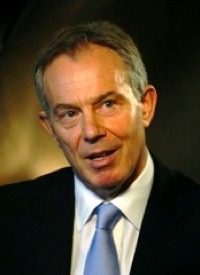
Tony Blair, global-warming activist and former British prime minister, is under fire from the media for allegedly trying to cash in on climate change. His company, Windrush Ventures, Ltd., registered a new Internet name of “Low Carbon Capital Fund” just weeks before the UN Climate Change Conference in Copenhagen. David Derbyshire with the Daily Mail reports that some view this as Blair’s way of preparing to make money off green technology. Derbyshire questioned Blair’s office, and a spokesman responded, “From time to time, we register names in an area we may be interested in.”
The name “Low Carbon Capital Fund” certainly calls to mind carbon trading, a process whereby individuals and companies that emit more greenhouse gases than others must buy permits to do so. The U.K. newspaper Express reports that when a carbon trading scheme was introduced in the EU, large, established businesses such as oil companies made huge profits at the expense of expanding ventures and public services. “Shell made a profit from carbon trading of £49.9 million and BP a profit of £43.1 million. NHS Hospitals, meanwhile, made a loss of £5.8 million.” Eventually, EU carbon permits were over-printed and over-inflated, and the system collapsed.
Undeterred, EU officials introduced a new system that devastated communities in northeast England when area steel mills shut down and moved to India, where permits are not required. Meanwhile, the parent company sold its unused credits for £1.2 billion and made no reduction in carbon emissions. As the Express noted, “Just wait until the carbon market goes global.” Indeed, the EU carbon-trading scheme provides a glimpse into the future of American business if current cap-and-trade legislation before Congress is enacted. The Express article pointed out that banks in the United States are lobbying for cap-and-trade, and it is small wonder if there is so much money to be made.
However, Tony Blair’s intentions for his “Low Carbon Capital Fund” remain a mystery with little chance of being discovered as he set up Windrush Ventures in such a way as to evade U.K. disclosure laws. Blair has made millions since leaving office in 2007, causing a furor of speculation as to his financial information. The Guardian newspaper set up an online contest, dubbed the “Blair Rich Project,” to “solve the mystery of Blair’s finances.” An accountant discovered that Blair set up Windrush as a partnership of partnerships, 12 entities total, a structure not covered by U.K. business regulations. The Guardian reports that Blair’s set-up is perfectly legal and allows him to keep most financial information secret, though it costs thousands of British pounds in legal fees annually to keep up the complex labyrinth. A Blair spokesman explained it as “simply an administrative vehicle established in order to allow Mr. Blair’s office sensibly to administer his different projects.”
Blair described himself as “a social entrepreneur” in a recent interview with The Financial Times. Besides Windrush Ventures, he operates Tony Blair Associates, a foreign affairs advisory firm, and he acts as a highly paid “global strategic advisor” to JP Morgan and Zurich Financial Services. His public speaking engagements earn in the neighborhood of £100,000. He does “unpaid humanitarian work” through the Tony Blair Faith Foundation, a charity of which he is the sole member and president. The Telegraph reports that the Tony Blair Faith Foundation, established to encourage inter-religious dialogue, earned more than $1.1 million in 2008 but refuses to publish its list of donors.
Blair also works with the Climate Group, an international business coalition and UN non-governmental organization (NGO). At Copenhagen, he launched the Climate Group’s report “Doing the Deal: Key Elements for a Copenhagen Climate Agreement.” Among the recommended goals for national governments in the coming years, the report lists: “Agreeing to develop Low Carbon Growth Plans that help as yet unidentified emission reduction opportunities to be uncovered.” The report goes on to explain: “Financing will also have to be made available, in particular to support mitigation efforts in developing countries. Here it is important that public money is used to maximize private sector investment. Deep and broad international carbon markets will play a crucial role in directing this investment towards the best opportunities.” In light of this, Blair’s “Low Carbon Capital Fund” is perhaps not so mysterious after all. Just don’t expect any disclosure.
Photo of Tony Blair: AP Images




